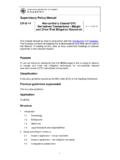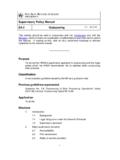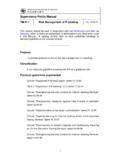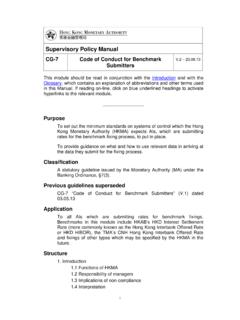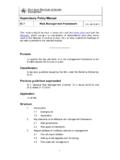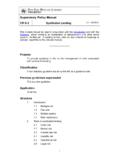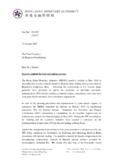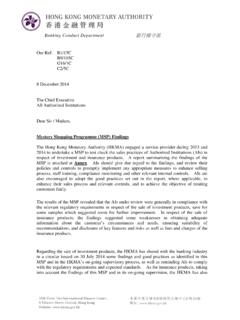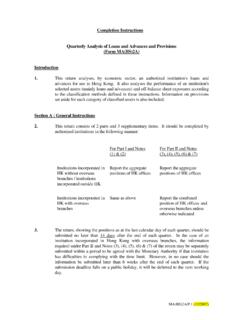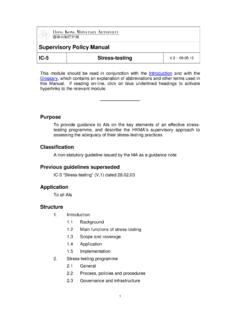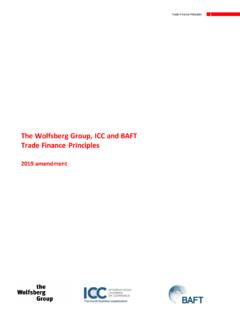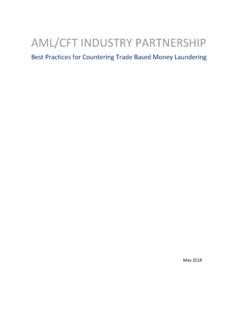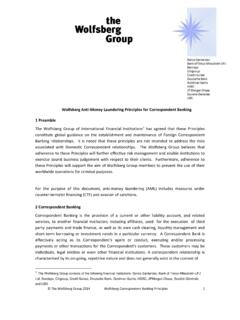Transcription of Guidance Paper on Combating Trade-based Money Laundering
1 The Hong Kong Association of Banks Guidance Paper on Combating Trade-based Money Laundering 1 February 2016 This Guidance Paper on Combating Trade-based Money Laundering ( Guidance Paper ) has been developed by the Hong Kong Association of Banks (HKAB) with input from the Hong Kong Monetary Authority (HKMA). The practices recommended in this Guidance Paper do not form part of the Guideline on Anti- Money Laundering and Counter-Terrorist Financing (for Authorized Institutions) (AMLO Guideline). However, the HKMA considers that the adoption of these practices will assist authorized institutions (AIs) in not only meeting the legal and regulatory obligations under the Anti- Money Laundering and Counter-Terrorist Financing (Financial Institutions) Ordinance (AM LO) and the AMLO Guideline, but also in implementing effective measures to further mitigate their Money Laundering and terrorist financing (ML/TF) risks.
2 Als should also take appropriate measures to ensure compliance with Hong Kong s sanctions regime, and obligations under Hong Kong law in respect of weapons of mass destruction (WMD) proliferation. In addition to meeting requirements under Hong Kong laws, these practices will also help Als operating internationally to meet relevant overseas sanctions regimes that are applicable to them. The HKMA therefore expects every AI to give full consideration to the adoption of the practices that this Paper recommends where necessary, to improve their anti- Money Laundering and counter-terrorist financing (AM L/ CFT) systems, taking into consideration the ML/TF risks to which they are exposed.
3 1 Introduction Trade-based Money Laundering has been recognised by the Financial Action Task Force (FATF) in its 2006 study as one of the main methods by which criminal organisations and terrorist financiers move Money for the purpose of disguising its origins and integrating it back into the formal economy. A number of other competent authorities and industry groups, such as the wolfsberg group , have also highlighted the risks in this area. trade is an important part of the Hong Kong economy. Hong Kong s role as an international financial centre, and confidence in the integrity of the banking sector may be adversel y affected if Als do not have appropriate systems and controls to manage various risks which may arise in the provision of financial services to support this important aspect of the Hong Kong economy.
4 The recommendations set out in this Guidance Paper are supplementary to, and do not supplant, any relevant legislation, codes, guidelines or rules applicable to Als. They are neither intended to, nor should be construed as, an exhaustive list of the means of meeting AIs statutory and regulatory requirements, nor does it provide prescriptive Guidance on specific transactions or relationships. In particular, this Guidance Paper must be read together with the following legislation, as well as related subsidiary legislation and Guidance : (a) AMLO; (b) Organized and Serious Crimes Ordinance (Cap.)
5 455); (c) Drug Trafficking (Recovery of Proceeds) Ordinance (Cap. 405); (d) United Nations (Anti-Terrorism Measures) Ordinance (Cap. 575); (e) United Nations Sanctions Ordinance (Cap. 537); and (f) Weapons of Mass Destruction (Control of Provision of Services) Ordinance ( ). 2 It is open to AIs to take alternative measures to manage relevant risks relating to ML/TF, sanctions and WMD proliferation. HKAB recommends that such alternative measures, and the rationale for adopting them, be appropriately documented, bearing in mind the HKMA s expectation for AIs to give full consideration to the practices specified in this Guidance Paper .
6 2 About Trade-based Money Laundering Key Concepts Trade-based Money Laundering was originally defined by FATF in 2006 as the process of disguising the proceeds of crime and moving value through the use of trade transactions in an attempt to legitimize their illicit origins. The FATF Paper on Best Practices (2008) broadened the definition to include terrorist financing, such that the current FATF concept is defined as follows: [ Trade-based Money Laundering ] and terrorist financing (TBML/FT) refer to the process of disguising the proceeds of crime and moving value through the use of trade transactions in an attempt to legitimize their illegal origin or finance their activities.
7 This definition recognises that terrorist organisations also engage in a variety of criminal activities, ranging in scale and sophistication from low-level crime to serious organised crime. This Guidance Paper refers to this expanded concept as Trade-based Money Laundering . However, it is not intended to be limited to ML/TF. As noted in the introduction and in paragraphs and , sanctions1 and WMD proliferation risks should also be mitigated. As a result, references to M L/TF in this Guidance Paper should be read broadly to include these issues, where appropriate.
8 The crux of this concept is the use of trade transactions to facilitate ML/TF. For the purposes of this Guidance Paper , the term trade transactions is intended to be interpreted broadly to refer to both domestic and international transactions in respect of goods or services between a buyer and a seller. The precise scope of the concept relies on the individual AI s own judgment, using a reasonable approach. Indicative examples of certain typical products and services provided by AIs (as intermediaries in trade transactions) are set out in paragraph A reference to trade -related activities in this Guidance Paper refers to activities carried out by AIs involving trade transactions.
9 The focus of this Guidance Paper is on the trade -related activities of AIs with their customers and relevant third parties, which can include non-banking entities. However, AIs should also consider the Trade-based Money Laundering risks of their bank-to-bank relationships, and take appropriate steps as necessary. trade Products While there is no exhaustive list of trade -related products and services, some indicative examples of products or services that typically fall within the scope of trade finance services provided by AIs, and therefore within the scope of this Guidance Paper , include.
10 Bank guarantees Documentary collections Financing under open account transactions Forfaiting and risk participation Import/export loans Packing loans Pre-shipment loans Structured trade financing Trust receipts Warehouse financing 1 Sanctions include United Nations Security Council sanctions and other national and regional sanctions. They include: (a) country-based financial sanctions that target specific individuals and entities; and (b) Trade-based sanctions, for example, embargoes on provision of certain goods, services or expertise to certain countries.
